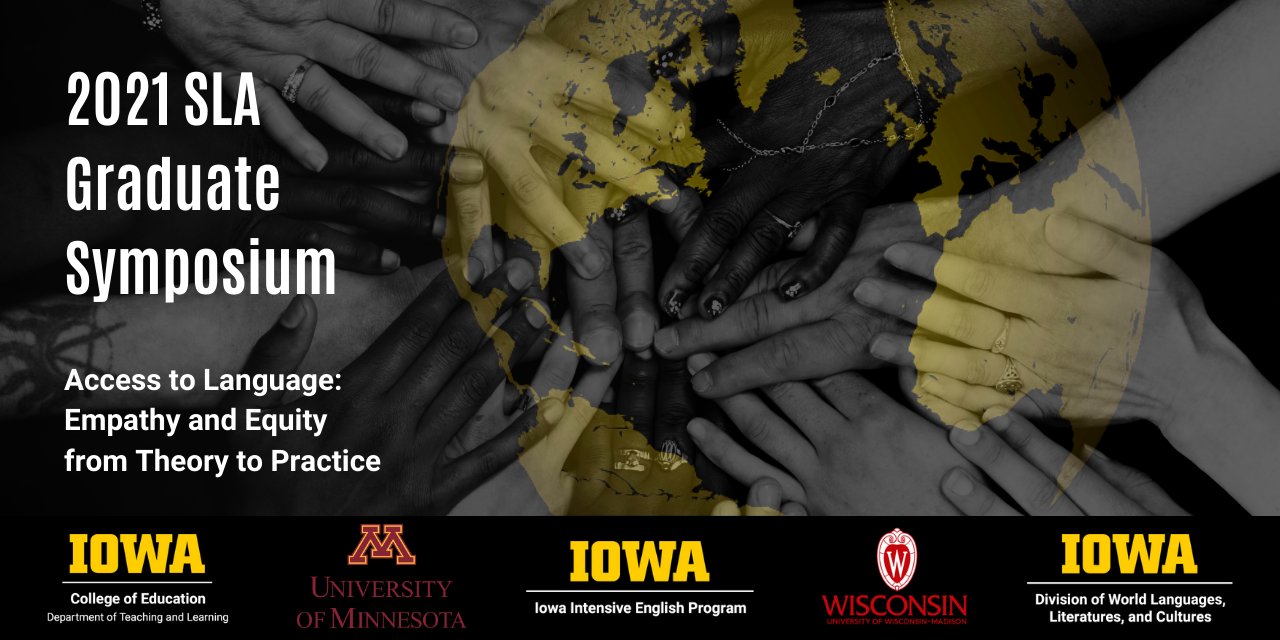2021 SLA Graduate Symposium

On behalf of the SLA Symposium Organization Committee, we want to thank you for attending the 2021 SLA Graduate Symposium edition, hosted virtually at the University of Iowa on April 16 & 17. We hope that you found the symposium informative and worthwhile.
See you next year for the 2022 SLA Graduate Symposium at the University of Wisconsin-Madison!
SLA SYMPOSIUM 2021 AWARDS
AUDIENCE CHOICE
Noelle Kerber and Jacqueline Shea, Arizona State University: Sorry, that's all I know!: A study on pragmatic-apology instruction with novice FL learners
Ekaterina Sudina, Northern Arizona University: Whom are we surveying and how? Insights from L2 anxiety and motivation research and implications for study quality
Annette Vernon, University of Iowa: An Evaluation of the ELPA21 Assessment: Reliability andValidity
FACULTY CHOICE
Emre Basok, Ohio State University: The Implementation of the State Seal of Biliteracy in Ohio
Tamar Bernfeld, University of Iowa: Translingualism Theory, Practice & Positionality
Xue He, University of Iowa: Second Language Acquisition of Chinese Directional Complement Constructions
Program (At a Glance): Clic Here to Open a Shorter Version of the Program
Program (Full Version): Clic Here to Open the Full Version of the Program
Keynote speaker: Dr. Kate Seltzer, Rowan University.
“My English is its own rule”: A Critical Translingual Approach to “English” Education
Clic here to open the abstract of the presentation.
Learn more about Dr. Seltzer here
Plenary speaker: Dr. Kamran Khan, Universitat Oberta de Catalunya.
‘Ideological Becoming’ and empathy in the British citizenship test
Click here to open the abstract of the presentation.
Learn more about Dr. Khan here
Hosts: Teaching and Learning Department, College of Education; Division of World Languages, Literatures, and Cultures, College of Liberal Arts and Sciences; University of Iowa Intensive English Program
Sponsored by: Department of Asian & Slavic Languages and Literature; Department of Spanish & Portuguese; Department of Teaching & Learning; International Programs; Graduate and Professional Student Government; University of Iowa Intensive English Program
The 2021 SLA Graduate Symposium is a two-day virtual symposium hosted jointly by the Department of Teaching and Learning and the Division of World Languages, Literature and Cultures at the University of Iowa. Due to the growing interest in equity and diversity issues in education, we believe that this symposium will provide a safe place where scholars, students, educators, and community members can have an open discussion about the critical issues at hand. We hope this will be an excellent opportunity for graduate students to gain experience presenting their own research, as well as meeting other researchers with similar interests and learning from guest speakers who are well-known in the field.
This year’s conference will be different from previous ones in two unique ways. First, we will be hosting the conference online. This affords us the opportunity to invite graduate students not only from domestic universities (including the University of Madison-Wisconsin, the University of Minnesota and the University of Iowa), but also universities in other countries such as Korea, Taiwan, and Egypt. In addition, this year, we are inviting local language educators in hopes of encouraging interdisciplinary collaboration and connections between research and teaching.
Objectives for the conference:
- Conference presentations will contribute to the literature on linguistic diversity, language contact, language equity, and access to language learning opportunities through technology and innovation.
- Presentations will provide language educators and graduate students (within the Iowa City community and beyond) with new findings in the field of applied linguistics that may be applicable to their own research and practice.
- Presenters and attendees will seek to bridge the divide between research and language instructional practice in order to empower bilingual educators in higher education and K-12 education.